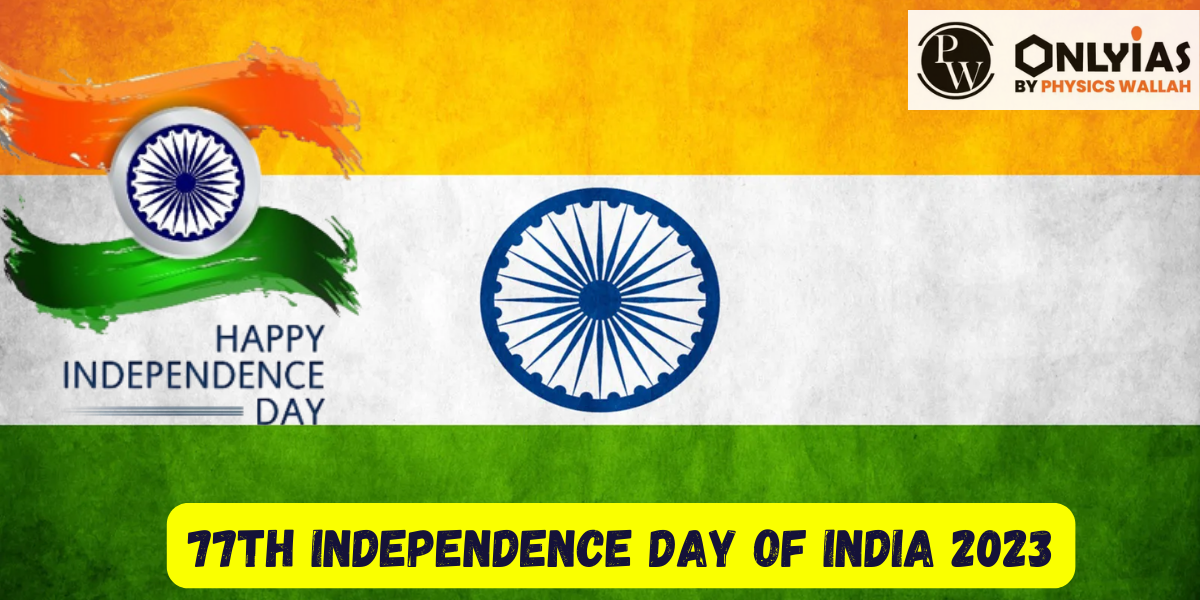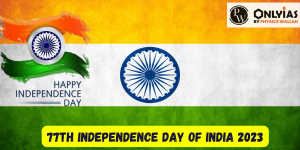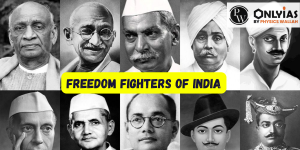
Every year, on the 15th of August, Independence Day is observed as a national holiday in India. This year in 2023, we will be celebrating the 77th Independence Day of India. In this article we will learn about the Significance and some Important Facts about the 77th Independence Day of India.
India, a land of diverse cultures, traditions, and languages, celebrates its Independence Day on the 15th of August with great zeal and fervor. This significant occasion marks the day when India gained freedom from British colonial rule in 1947, making it one of the most crucial milestones in the country’s history. Independence Day is a time of reflection, patriotism, and unity as the nation pays tribute to its valiant freedom fighters and celebrates the spirit of being an independent and sovereign nation.

Independence Day of India marks the country’s liberation from British colonial rule on the same date in 1947 when the Indian Independence Act took effect, granting legislative sovereignty to the Indian Constituent Assembly. At that time, India retained King George VI as its head of state until it transitioned into a republic with the enforcement of the Constitution of India on the 26th of January 1950, celebrated as Indian Republic Day. This significant event replaced the term “Dominion of India” with the official name “Constitution of India.” The road to independence was paved by a remarkable independence movement characterized by predominantly non-violent resistance and civil disobedience.
In preparation for the upcoming Independence Day celebration, the use of various “sub-conventional aerial platforms,” such as drones, paragliders, hang-gliders, and hot air balloons, has been banned in Delhi from July 22 to August 16 due to security concerns. The Delhi Police commissioner has issued a restriction on the flying of these aerial devices within the jurisdiction of the national capital during the Independence Day period. Violation of this restriction may lead to punishment under Section 188 of the Indian Penal Code (IPC), which deals with disobedience to orders issued by public servants.
The struggle for independence in India was a long and arduous journey, marked by various non-violent movements led by iconic figures like Mahatma Gandhi, Jawaharlal Nehru, Subhash Chandra Bose, and countless others. These leaders, along with the masses, fought tirelessly against British rule, demanding the right to self-governance and freedom from oppressive policies. After years of sacrifice, dedication, and non-violent protests, the Indian Independence Act was passed by the British Parliament, and India finally gained its freedom on August 15, 1947.
Independence Day in India is celebrated with immense joy, enthusiasm, and patriotism. The day begins with the hoisting of the national flag in schools, government offices, and public spaces. The tricolor, representing courage, peace, and truth, flutters proudly in the air, symbolizing the unity of the nation in its diversity.
One of the most iconic ceremonies takes place at the Red Fort in New Delhi, where the Prime Minister of India hoists the national flag and addresses the nation. The event is attended by high-ranking officials, foreign dignitaries, and citizens from all walks of life. The Prime Minister’s speech reflects on the nation’s progress, achievements, and challenges while emphasizing the spirit of unity and progress.
Independence Day is not just about political significance; it also holds cultural importance. Various cultural programs are organized across the country, showcasing India’s rich heritage and diversity. People participate in singing patriotic songs, performing traditional dances, and organizing theatrical performances that portray India’s struggle for freedom and its unity in diversity.
Independence Day instills a strong sense of patriotism in the hearts of every Indian. It is a day when citizens come together to celebrate their freedom and express their love for the nation. People proudly wear the colors of the Indian flag, and streets are adorned with decorations displaying the tricolor. The sense of unity and belongingness among people from different backgrounds is evident as they celebrate as one nation, setting aside their differences.
Independence Day is also a time to pay homage to the countless freedom fighters who sacrificed their lives for the nation’s freedom. Special ceremonies and tributes are held at various memorials and monuments across the country to honor their courage and dedication.
List of Freedom Fighters of India 1857-1947
As we celebrate Independence Day, it is essential to remember and honor the sacrifices made by these extraordinary individuals. Their dedication and resilience serve as a reminder that freedom is not a gift but a hard-fought right that demands vigilance and unity.

India’s struggle for independence spanned several decades and witnessed a myriad of leaders, each contributing their unique vision and strategy. Mahatma Gandhi, the father of the nation, led the non-violent civil disobedience movement against British rule. His principles of truth, non-violence, and harmony continue to inspire the world.
Other prominent leaders like Jawaharlal Nehru, Sardar Vallabhbhai Patel, Subhash Chandra Bose, Bhagat Singh, Rani Lakshmibai, and many more became symbols of resistance, motivating ordinary people to rise against oppression. These leaders were instrumental in uniting the diverse Indian populace under one common goal – freedom from colonial rule.
The freedom fighters endured immense hardship, facing brutal treatment, imprisonment, and even sacrificing their lives for the greater good. Their relentless determination and unyielding spirit became the driving force behind the independence movement, shaking the foundations of the British Empire. Countless anonymous heroes also played pivotal roles in the struggle, their names and stories lost to history, but their contributions forever etched in the annals of India’s independence.
Mahatma Gandhi’s philosophy of non-violence, or “Satyagraha,” became the bedrock of the independence movement. His belief that peaceful resistance could dismantle the oppressive rule left a profound impact on the world. Despite facing violence and repression, the freedom fighters adhered to these principles, showing extraordinary resilience and inspiring future generations to pursue peaceful means for change.
The legacy of India’s freedom fighters extends beyond the boundaries of time and geography. Their indomitable courage and selfless devotion to the nation continue to inspire not only Indians but people worldwide, inspiring movements for justice, liberty, and human rights. The idea that a handful of determined individuals can bring about monumental change has inspired many social and political movements across the globe.
While Independence Day is a time for celebration, it also serves as a reminder of the challenges that lie ahead. It is an occasion for the nation to introspect and reiterate its commitment to progress, inclusivity, and the well-being of all citizens. The day serves as a catalyst for reflection on the nation’s achievements and a call for continued efforts to address issues such as poverty, illiteracy, inequality, and environmental concerns.

Independence Day of India is celebrated on August 15th each year to mark the country’s independence from British rule. Here are some key facts about this significant day:
Independence Day is a significant national event that reminds Indians of their hard-fought freedom and the responsibility to work towards the progress and development of the nation. It is a day of celebration, reflection, and renewed commitment to the ideals of liberty, equality, and fraternity.
Jawaharlal Nehru Biography, Education, Wife, Books, Death, History
Yes the Indian Independence Day of 2023 is the 77th Independence Day of India.
जी हां 2023 का भारतीय स्वतंत्रता दिवस भारत का 77वां स्वतंत्रता दिवस है। हां 2023 का भारतीय स्वतंत्रता दिवस भारत का 77वां स्वतंत्रता दिवस है।
The Independence Day of India in 2023 is the 77th Independence Day of India.
India got independence on August 15, 1947. As of 2023, it has been 76 years since India gained its independence.
<div class="new-fform">
</div>